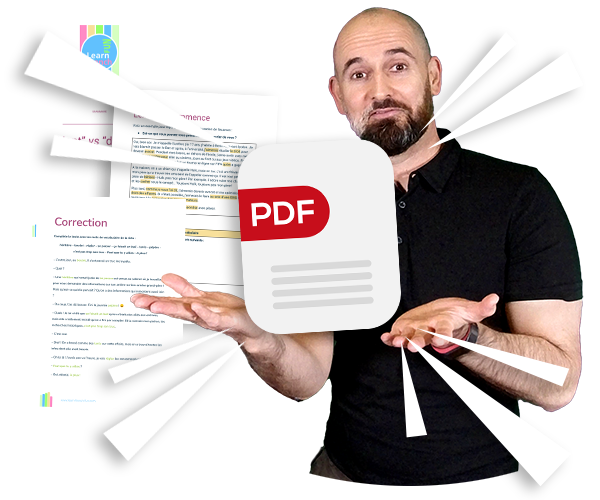Hey French students! I hope you’re all doing well in class. Today, I want to talk about how to pronounce the French vowels correctly. This can be tricky for some of you, but with a little practice, you’ll be sounding like a native in no time! So let’s get started.
You know, even a French person, depending on his region and his accent, can have difficulties with the phonetics of vowels 😀

PDF Bonus
We have prepared a free PDF to help you how to pronounce the French vowels correctly.
👉 Download it for free
At the end, you will have exercises to practice with the correction. 👍
What are the vowels in French?
1. a, e, i, o, u
Attention, the sounds: [e] and [o] are unique in French. That is to say that there is, each time, only one letter in the alphabet which has the same phonetics.
2. y
Its name is “i grec“. That’s how you pronounce the name of the letter.
But if the letter is in a sentence, in a text, you will pronounce it [i].
Examples:
- J’y vais.
- Yves.
But if you spell the name Yves, that is, if you say each letter of the name: “i grec – v – e – s”.
3. h ???
The “h” is not really a vowel, but since it is not pronounced, it can be considered as a vowel. It is then said to be a silent “h” (h muet). This is the case in almost all words that start with an “h”.
Examples: Homme, hôtel, hôpital, etc.
There are two consequences:
1. You have to know the spelling of the word because you can’t find it just by listening to the word.
But honestly, it’s not just because of the “h” that spelling in French is difficult… is it?
2. You make the connection.
Examples: un_homme, un_hôtel…
But, of course, there are exceptions.
You still don’t pronounce the “h” but you don’t have to make the connection and there is no apostrophe. In this case, it’s no longer a silent “h” (h muet) but an aspirated “h” (h aspiré).
That’s its name 😂 “Aspirated h“.
Examples: un hibou, un héros, en haut (an owl, a hero, up…)
Do you like learning French with videos?
Receive our free video newsletter every Friday in your e-mail box. You will get 3 “Tips & Tricks” on grammar, vocabulary, phonetics or French culture.
👉👉 Sign up now!
How to pronounce French vowels correctly?
Here are some examples:
A → rabbit (lapin)
E → as in the number 2 (deux) or the article “the” (le).
I → “here” (ici)
O → “logo“, “lotto“
U → Like the subject pronoun: “tu” or the preposition “du“: Je bois du café.
Particularities of French vowels?
1. They are rarely next to each other. The French language doesn’t like that.
And when they are side by side, they usually combine to give a new sound.
Examples:
- a + u = [O] → autour (around), faux (wrong)
- e + i; a + i = [ɛ] ê → peigne (comb)
- o + u = [u] ou → le cou (neck), le loup (wolf)
And if the French vowels are next to each other between two words:
“Le âge”, then we use an apostrophe → l’âge.
2. A connection is made between a consonant and a vowel, which allows two words that follow each other to be connected phonetically.
Example: Les amis
You don’t say : “les + amis“, but: “Les_amis”.
Because the last letter of the 1st word is a consonant (s) and the 1st of the 2nd word is a vowel (a). You then make the phonetic connection between the two.
So, you think: “Great, in French, we pronounce sounds that don’t exist, just to connect the words! Well okay, now that I know that, I’ll still be able to do it.“
Um… Well, actually, no! We don’t do all the connections because some are forbidden. For example with the word “et” (and).
Example: Je suis allé à Paris et à Nice. (I went to Paris and Nice.)
You don’t say: “”…et [ta] Nice…”. You don’t make the phonetic connection.
How do you know then?
At the beginning, make the connections between:
- the article and the noun (les_amis, un_avion),
- and, between the adjective and the noun (le petit_homme, un grand_idiot)
Ah yes, you will laugh… Or not… But when the last letter is a “d” we pronounce the bond: “t“.
Un grand_idiot → un [gran] [ti] [dio]
There are some exceptions, but normally, it’s ok! 👍😊
What are the classic difficulties students have with the French vowels?
u → as “ou”: NO!!!
- Lulu vs Loulou
- Cul (ass) vs Cou (neck) → it’s not exactly the same place on the body 😂
To avoid making the mistake, remember that the “u” is pronounced like in the word “tu“.
Only when you see “o + u” do you pronounce “ou”.
e → like “é”: NO!!!
Be careful with the present tense!
“Je chante” <> “Je chantais”. (“I sing” is not the same as “I sang“.)
If you pronounce the final “-e” as an “-é”, the person you are talking to, will think you are talking in the past tense, for example in imparfait.
They won’t think: “oh, what a cute little accent“; no, they will think you are speaking in the past tense! This can create a misunderstanding…
When you spell a word, your name for example.
Example: “Bond, James Bond”
You say: “J – A – M – E – S” if you want to spell it.
French pronunciation can seem daunting at first, but with a little practice it’s easy to get the hang of.
The five French vowels are very different from their English counterparts, so make sure you spend some time practicing the correct pronunciation. Once you have the basics down, focus on working on your accent and sounding like a native speaker.
And don’t forget – practice makes perfect!
How well do you know the French vowels? Have you tried pronouncing them correctly? What was your experience? Let us know in the comments below.
Articles that might interest you:
- In France, are discussions at the coffee machine more important than meetings?
- 3 tips to speak French easier
- How can I improve my French accent?
- I’m afraid to speak French
- 3 different ways to pronounce the French word “Plus”
- How to pronounce the French vowels correctly?
- I start to dream in French!
- How to learn French pronunciation?
- Learn French in Montpellier, Paris or somewhere in France to gain your intellectual freedom
- Learn French like a child



